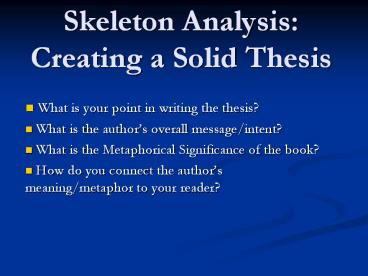Skeleton Analysis: Creating a Solid Thesis - PowerPoint PPT Presentation
Title:
Skeleton Analysis: Creating a Solid Thesis
Description:
Skeleton Analysis: Creating a Solid Thesis What is your point in writing the thesis? What is the author s overall message/intent? What is the Metaphorical ... – PowerPoint PPT presentation
Number of Views:47
Avg rating:3.0/5.0
Title: Skeleton Analysis: Creating a Solid Thesis
1
Skeleton Analysis Creating a Solid Thesis
- What is your point in writing the thesis?
- What is the authors overall message/intent?
- What is the Metaphorical Significance of the
book? - How do you connect the authors meaning/metaphor
to your reader?
2
An example
- On the surface, Mark Twain's The Adventures of
Huckleberry Finn is a story about a young boy's
quest for his own brand of freedom. However,
upon closer reading, Twain clearly uses the
journey of Huck Finn to illustrate that our
personal morality can be at odds with the
morality of society. If we are honest with
ourselves, we will invariably know the difference
between moral right and wrong. - What does this thesis tell you in terms of
- Metaphorical significance?
- What the authors direction is?
- What to look for in terms of support?
3
- Perhaps the most memorable trait of
- any species of bean tree is its remarkably
deep - roots. Despite its stable nature, the bean
tree suffers greatly when Mother Nature
drastically changes its course. There are
countless ways by which a bean tree can lose its
life, still its deep roots stay in tact and
somehow, every year, it breathes life again. In
Barbara Kingsolvers The Bean Trees, natures
cycle of rebirth is paralleled with the repeated
death and resurrection of Turtle Greer.
4
Organize your Skeleton
- Thesis Statement Must be written as analysis
- Quote 1
- Support statement (analysistie into thesis)
- Quote 2
- Support Statement (analysistie into thesis)
- Quote 3
- Support Statement
- Quote 4
- Support Statement
- Conclusion
5
Literary Criticism
- Literary criticism analyzes, interprets, and
evaluates works of literature. - Authors present us with work that can have
multiple meanings, expecting us to consider
thoughtfully--to interpret. Noted authors
often have a body of criticism attached to their
work. Critics evaluate and debate the ideas of
fellow critics. - When looking for criticism, check for
- Credentials of the writer
Quality of the sources--journals, books,
Websites - Opinions supported by evidence, relating to
- Characterization Voice Style Theme
Setting - Technical qualities of the writing (artistry,
style, use of language) - Interpretation Complex
ideas and problems - Relationship of work to the time, or social,
historical, or political trends - When looking for criticism, AVOID
- Plot summaries, SparkNotes, Pink Monkey, etc.
- Casual posts on discussion groups
- The works of other students
- Author biography































